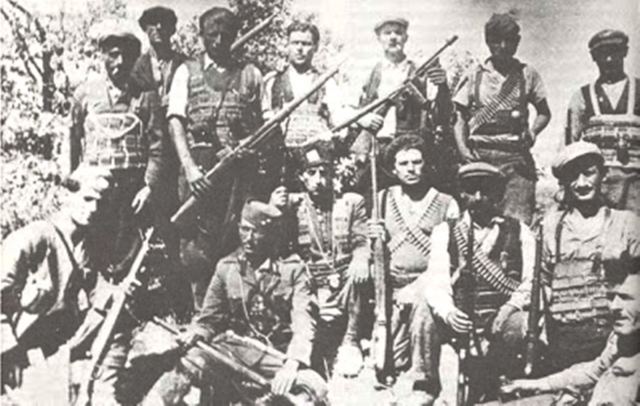The Bulgarian national flag in front of City Hall in Drama, photo: proinos-typos.gr
Struma (Strymónas) River was the boundary between the Bulgarian and the German occupation zones, and all who had fled from their villages in Western Thrace and Eastern Macedonia and managed to cross the river, said they were coming into "Free Greece". The fact that this was what they called the part of the country occupied by the German and Italian troops corroborates that repressions in the Bulgarian occupation zone were much more ruthless. Most of the adults in these areas had already experienced two Bulgarian occupations – in 1912-1913 and 1916-1918. Those of the local residents who could afford it managed to escape the third Bulgarian occupation: some by jumping on the last trains, which left just before the Bulgarian troops filed down the border, others by boat at sea, still others mounted on their carts. Most of those who stayed back were Greek refugees from Asia Minor; they had been accommodated under the Treaty of Lausanne. They chose to stay as they didn't have the experience of the previous two occupations. Most of the others, who did not leave the Bulgarian zone, were tobacco workers, most of whom were members of the Greek Communist Party. As a matter of fact, the Greek national resistance was born precisely here, and its first action was the Drama rebellion.
The end of repressions
When the Germans saw that Thessaloniki was inundated with refugees, they decided to send a mission to the Bulgarian occupation zone and investigate the reasons behind the exodus. They had concerns that the crowds of people in Thessaloniki's streets and squares were vulnerable to various diseases, e.g. typhus. And this put an end to the repressions committed by Bulgarian troops.
Subsequently, the insurgency actions organised by the Greek resistance triggered repressions on behalf of the German troops as they were taking place in the German occupation zone. For instance, 17th of October 1941 saw the carnage in the villages of Ano and Kato Kerdilia, which was a reprisal for the initial sabotage actions of the first armed group (called ‘Odysseas Androutsos’ after the Greek War of Independence hero) of Greek resistance in the area.

An apology, which has yet to come
An often debated subject in our region is the fact that no Bulgarian government has ever offered an apology for these pogroms. The Germans came and put a wreath by the monument of the victims in Kerdilia. The Bulgarians however never came to Doxato to lay a wreath for the massacres they committed.
By no means are we wishing to spoil our good relations with Bulgaria. So often we buy Bulgarian goods, visit Bulgarian doctors and are on friendly terms with Bulgarian people. Yet I believe an apology by the Bulgarian state for what was committed by the grandfathers of contemporary Bulgarians is still lacking. At the end of the day, all these people became victims of fascism. This is history, and we can ill afford to forget it. Because every time history is forgotten, it comes back at us.